* Titles and affiliations are as of the time of the conference.
Presented at Third International Conference of Child Research Network Asia (CRNA) held in Jakarta, Indonesia, September 25-27, 2019.
Indonesia Early Childhood Care, Education, and Parenting
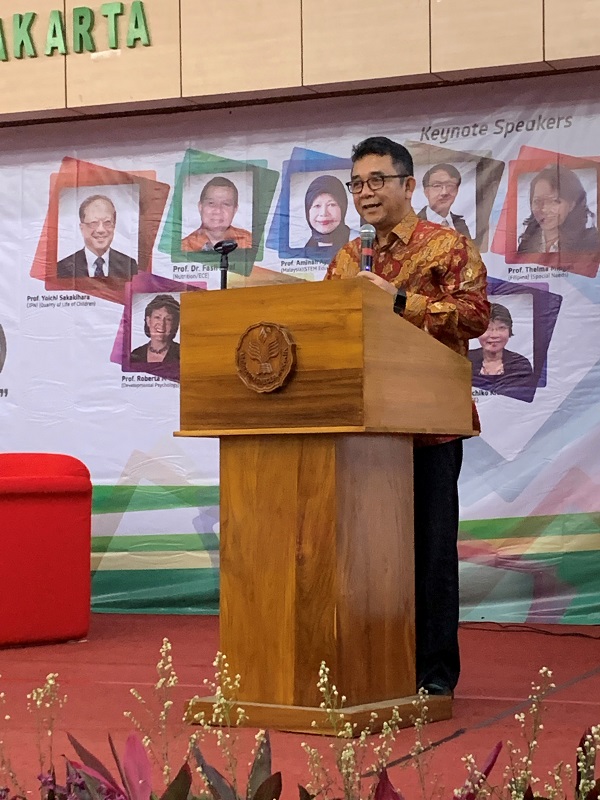
Today, my topic is about Early Childhood Care, Education, and Parenting Policies in Indonesia.
There are several examples of Artificial Intelligence (AI) that exceeds natural intelligence. These include Sophia - the social humanoid robot, Watson - the Q&A computer, and Deep Blue - the chess-playing computer. All of these technological advances are present today, and affect us all.
Thomas Friedman's book, "Thank You for Being Late: An Optimist's Guide to Thriving in the Age of Accelerations" explains how technology has accelerated exponentially since 1958, when the one block integrated circuit was developed. After five decades, Moore's law is still valid and relevant with human life globally. What's next for IT? Smartphones are notorious, even more important than your wallet. If we forget our wallet, the smartphone can be used to call someone to send it. But if we forget the phone, you have to go home. I know this from personal experience. We are in the age of a constant catch-up mode. The driving force for mankind is three 'M's: First, Machine, advancement of communication and technology. Second: The Market, globalization and free trade. Third: Mother nature, the demographic which we have to anticipate.
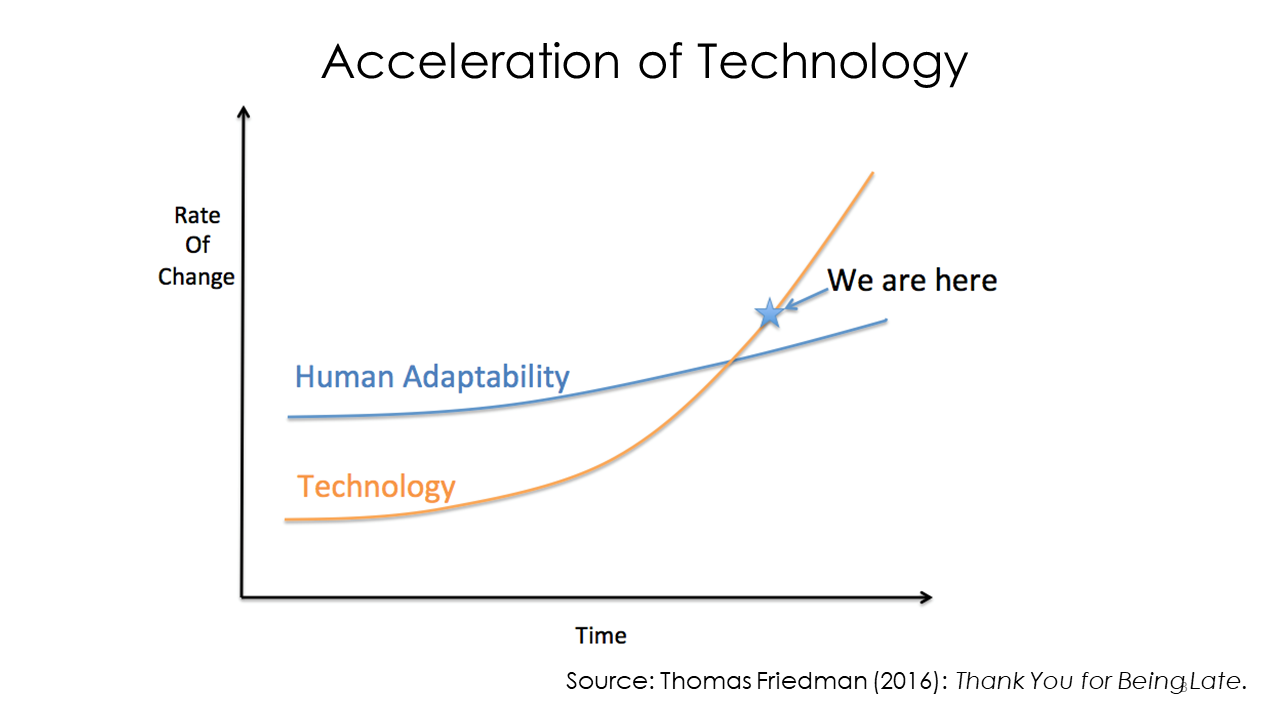
Skills Needed for the Next Generation
According to the World Economic Forum, the 21st century skills are critical to strive in today's global market. That is the key to the second M. Four Cs has become an agenda for our education system, focusing on Critical thinking and problem solving, Creativity and innovation, Communication, and Collaboration. Quality of character is vital, such as grit, passion, and perseverance. Adaptivity and leadership are crucial, not to mention cultural awareness. This is the challenge of the second M. Mother Nature poses a demographic challenge in that there are more people of productive age than non-productive in Indonesia. The implication is for employment. The challenge for educators, is to provide the next generation with better education and better skills to match an unknown future.
Our president, Joko Widodo gave this response in his speech:
- Ensuring the health of pregnant women, infants, toddlers, and school-age children
- Maintain golden age (early childhood) to improve the Indonesian people
- Prevent stunting, 1 in 3 Indonesians are still affected
- Reduce the infant and mother mortality rate
- Improve the quality of vocational education
- Building an Indonesian Talent Management institution to provide self-development support for the Indonesian diaspora
Responding to the Global Market, Population Increase, and Technological Advancement
The golden age is critical. All reports reconfirm that investment in early childhood education produces the best return. Thus, we have the 17 Sustainable Development Goals (SDGs'). One of them focuses on early childhood. In the next 10 years, by 2030 we aim to ensure all girls and boys have access to quality early childhood care, and pre-primary education, to prepare for primary education. This target is reiterated by the Presidential Regulation Number 59/2017 and article 5/3 on child wellbeing in Indonesia.
The Government Regulation Number 2/2018 also mandates various state agencies in the country to deliver early childhood education and equivalency education programs as part of their minimal standard services. This regulation provides a significant basis for policy development at the ministry and education office levels. Currently, our early childhood education programs mainly focus on children aged 5-6 years old. In the future we aim to be like Thailand, where they have 2-3 years before entering primary school at 4-6 years old. France has also started implementing compulsory early childhood education at the age of three. We have in regulation, an equivalency education program for 7-18 years old whereby persons of school age, but not attending school, can return to studying at school or at a community learning center.
So far, early childhood education policies campaigning on early childhood regulations have produced more than 20,000 centers. Out of those centers, 98% are community self-help centers of low quality, with no standards, but the government wants to identify them, bring in standards, give assistance and regulation to encourage registration in the education national database system. In the system, all institutions, teachers, students, are allocated with their own number. Registration and updating every semester are encouraged in order to benefit from governmental assistance.
Upon registration, they are encouraged to reach the academic national standard to get accreditation. We hope all centers will register and there will be incentives, assistance and accreditation for them. Thus, we can at least guarantee to the public that all centers are attempting to provide better quality in early childhood care and education at their centers.
We are promoting a holistic integrative approach in our early childhood education program whereby children can receive not only education, but also nutrition, health, and protection. All aspects of child wellbeing should be there as a holistic concept. Applying an academic structure to children at an early age needs to be discouraged and changed to a play-based approach.
Today, there has been 72.4% success of the campaign for one ECCE center per village. The number of villages also increases over time, so this may change. Out of the ECCE centers established in the villages, accreditation is still far from 100%, as only 25.35% of them were registered in 2018. One problem is that most teachers are high-school graduates, when the requirement is for at least university-level. We hope to work with universities to improve this situation.
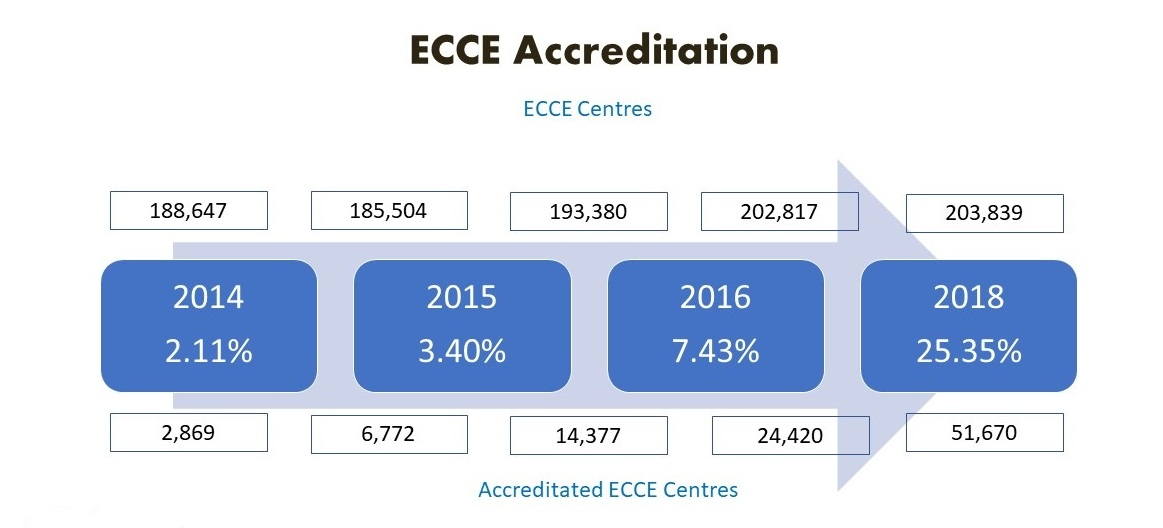
The second strategy in our policy is parenting, which is managed in the Directorate of Family Education, now in its fifth year. We believe that parents are the primary teacher, but they are the least prepared. Teachers spend four years studying, then another year for PPG (pre-service teacher training), but to be a parent, you just have to get married and have a child which can take less than a year. The real architect of mankind is parents. Thus, we have the Directorate of Family Education to support the next generation in terms of parenting skill, theory, and science. Synergy between school, parents, community and support for parenting programs has a positive impact on both parents' and children's well-being and mental health. More than 90 years ago, our first Indonesian Minister of Education and Culture, Ki Hajar Dewantara had already mentioned this. The three important social places for children are family, school, and the community. The concept is widely known as the three pillars of education. To make teaching effective, we have to make sure it is supported by what parents say and what is in the community. For example, teachers may say "smoking is deadly, don't smoke." But parents smoke, and the community has billboards advertising smoking. Will kids listen to the teacher? All educational messages will have zero effect, without this synergy between parents and the community.
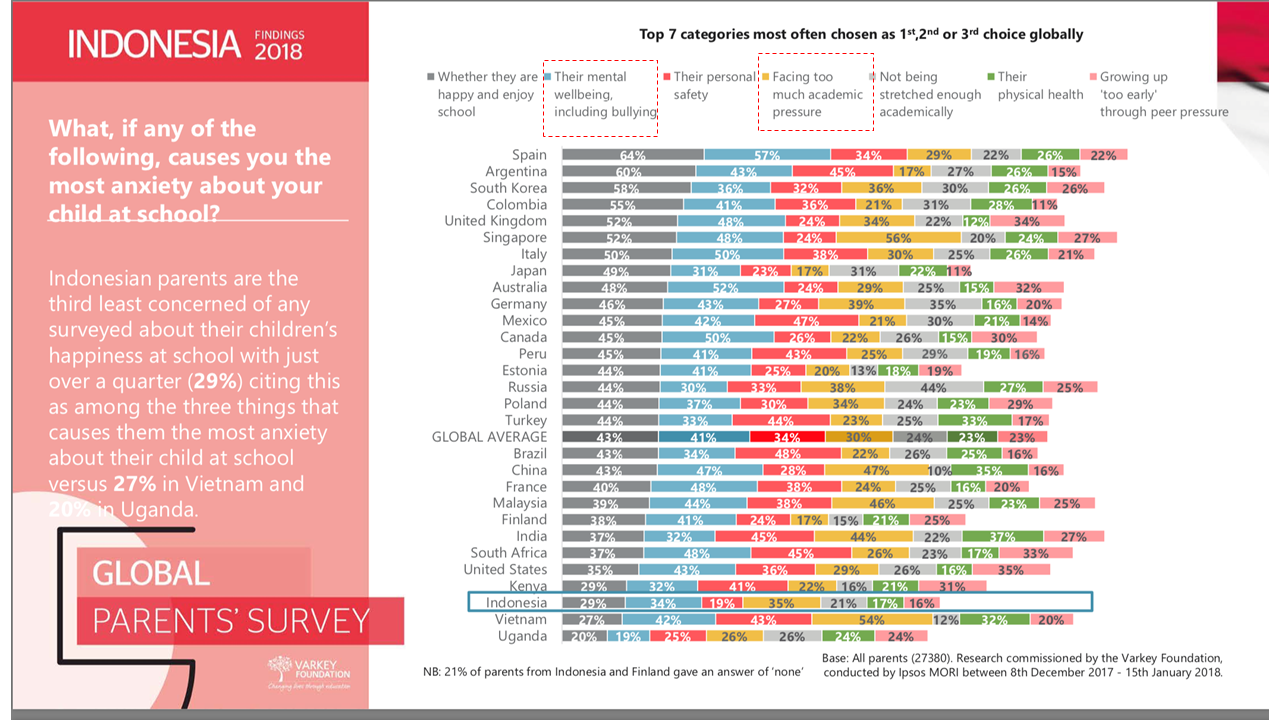
From this Global Parents' Survey, conducted by the Varkey Foundation in 2017-2018, we are motivated to promote parenting programs. The result above shows the top seven categories chosen by parents when asked what causes them the most anxiety about their child at school. It shows two things parents realize about the problems their child faces at school. Those who answered their children face too much academic pressure accounted for 35%, while 29% said it is their children's mental wellbeing, including bullying.
For parenting policies, prenatal education (first 1,000 days of life), and parental engagement in early childhood education is promoted. Strengthening of roles and involvement of parents in formal and non-formal education, prevention of stunting, support for national programs against human trafficking, and family character building are also promoted in our family education programs.
We have the SEAMEO CECCEP (Center for Early Childhood Care and Education and Parenting) in Lembang, Bandung. Its 3 visions are: early childhood education and development, capacity building (children, parent, teacher), and networking. It can also be effective if CRNA does a joint program, research, or sends researchers to work there. All are welcome.
As a portfolio of local government campaigning, there are a lot of initiatives. In Tanah Laut, South Kalimantan, there is no phone or TV between 6-9 pm. It is family time, to play and learn together, greeting and smiling to each other, and parental involvement at schools. Apart from that, as in Yogjakarta, there is time for reading.
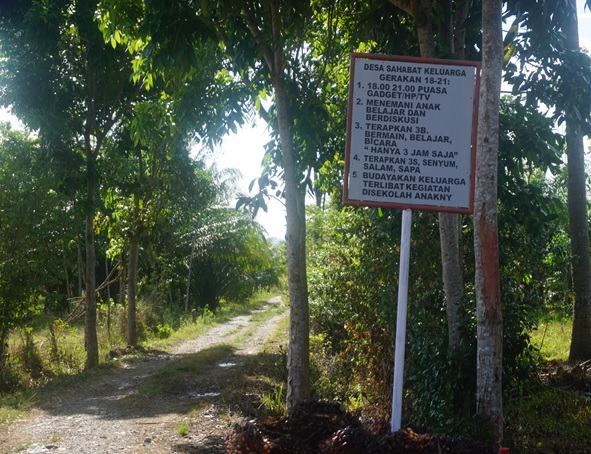
The Directorate of Family Education made a website called Sahabat Keluarga, intentionally designed to make it popular and familiar among parents. Not many sources support parents and children in early childhood, primary school, secondary school, and high school, but if you visit this website, it is all here -i.e. How to be great parents, how to learn together. You can also contribute by posting, as we have a team that selects your entries and posts them online.
The website also introduces a guideline for parents regarding the usage of media in children as follows:
"Staying Safe Online"
- Limit digital media usage time. Average Indonesians do 3 hours screen time. Less than 1 hour is desirable.
- Choose applications/programs that improve children's pro-social behavior. Do more outdoor physical and social activities.
- Avoid using media to replace the parental role.
- Have an agreement with children on digital technology usage, including the consequences if they break it.
- Encourage children to be critical on the information they receive and express their thoughts in writing.
- Avoid contents which promote violence, pornography, radicalism, and unacceptable behavior.
- Encourage children to explore their interests and potential. In our center, we introduce coding even for primary education kids. Instead of playing games, make their own.
- Ensure that children know how to behave and keep their privacy on social media.
I would like to say to parents, because children are the best copying machine, they do what they see. If we want to set limits for the use of smartphones or other digital devices on children, parents must control themselves first. Although the website is for ECEC teachers, you can refer to Ruang Guru PAUD where they introduce contents like songs, videos, games, and stories for free.

|
| http://anggunpaud.kemdikbud.go.id/ |
Useful Links for ECCE and Parenting |
Conclusion
- ECCE is a critical stage that lays the foundation for adulthood. SDG's pledge that by 2030, all girls and boys will receive quality early childhood education.
- Indonesian Government aims to facilitate growth and development of children as a whole, by emphasizing development of all aspects of the child's personality.
- Parenting in the digital era is quite challenging. Internet and technology could lead to negative development when not utilized properly.
- Therefore, strong networking among ECCE and parenting practitioners, parents, trainers, researchers, and policy makers becomes ever more urgent.
Q&A
Q1: I have a suggestion for pre-parenting, not only parenting, as I am concerned on family resilience. Based on my experience, to prepare to be a parent, our family have had lots of struggle, economic and work-wise, etc. The family resistance is low.
Is there any scheme on how our secondary, high school and college students can be prepared to be parents?
A1: It is challenging, but yes, there is such concern. A program that we have now is pre-marital. For Muslims, we have community advice, and suggestions on marital matters. Christians or Catholics have their own programs for pre-married couples. Here we have seven ministries involving parenting. Ministries of Education, Health, Social Affairs, Religious affairs, BKKBN (family agency), Ministry of Homing and Childhood, Bappenas, IPMK. So many of these ministries and agencies have portfolios in parenting with different angles surely. Through programs provided by these ministries, we can teach, tutor the parents, which will make parents in Indonesia great!
Providing training sessions before marriage is being worked on in the religious ministry. In the near future, you will have to get this certification first before you can get married.
Q2: I am in the field of Pediatric and public health in Malaysia.
Thank you for the interesting presentation. There were many resources such as the Sahabat Keluarga. But maybe the time has come to develop and share resources for parenting and social family sector education in Indonesia and Malaysia, where we share the same religion and similar culture.
Many universities in Malaysia and Indonesia can challenge young people to develop online sources on issues like these. Since most online sources are from the west, Malaysia and Indonesia may be able to compete to create these sources.
A2: Sahabat Keluarga is open for the public. CECCEP is in the Indonesian setting, but we can duplicate it in other countries because it can be adjusted.
Let me mention to you about the local wisdom. Indonesia has many ethnic groups, each have their own local wisdoms on parenting -ethno-parenting. Now we share in many countries and accept contribution from many countries how to make the next generation good, better than ours in terms of characters of 21st century skills, such as critical thinking, or collaboration.
-
Reference:
- World Economic Forum, 2016. New Vision for Education Unlocking the Potential of Technology.
- Varkey Foundation, 2018. Global Parents Survey : Indonesia Findings 2018.
https://www.varkeyfoundation.org/media/3736/17-091869-01-varkey-foundation-gps_indonesia-pack_230218_iuo-v2.pdf - MoEC, 2016. Seri Pendidikan Orang Tua: Internet Aman [Parenting Education Series: Safe internet], available at: https://bit.ly/2OdVxJv.



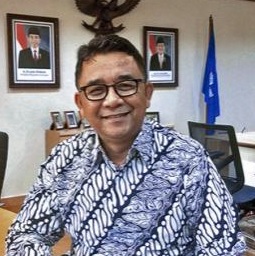 Harris Iskandar
Harris Iskandar










